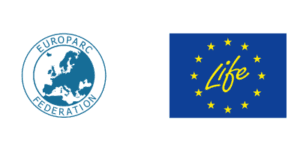Next EUROPARC Webinar: Restoring our marine environment to tackle Climate Change
Next EUROPARC webinar on marine restoration: 21st of December, 11:00 CET.
Our oceans and seas play an indispensable role in climate change mitigation and adaptation. However, deterioration of the marine and coastal environment is reducing its ability to do so.
Implementing measures that restore the natural capacity of the environment to mitigate and adapt to climate change can help “turn the tide”. Restoring our marine environment and improving its biodiversity is imperative if we want to maintain all the ecosystem services it has to offer.
In this webinar, we will look at nature restoration projects in two Mediterranean Marine Protected Areas. We will discover how different environmental factors are inventoried and how natural conditions are restored across the Mediterranean. The webinar will address the challenges and solutions of using nature restoration for climate change mitigation and adaptation.
Webinar Programme
Welcome and Introduction to the webinar
By Isa Vroom, EUROPARC Policy Assistant.
LIFE ADAPTABLUES project: Adaptation to climate change through management and restoration of European estuarine ecosystems
By Inés Mazarrasa – Researcher at the Environmental Hydraulics Insititute, IHCantabria, of the Universidad de Cantabria (Spain).
The project aims to support the conservation and restoration of estuarine ecosystems in Europe as a strategy to enhance adaptation to climate change in coastal areas of the Atlantic coast. To do so, they are developing technical methodologies and tools to estimate coastal protection and carbon sequestration services provided by estuarine habitats across five different estuaries in Europe, including an inventory of carbon deposits and burial rates. The project includes the restoration of a saltmarsh in Portugal.
ROC-POPLife and ReLife
By Lorenzo Merotto – Marine Biologist.
ROC-POPLife is a project aimed to trigger the restoration and growth of the Cystoseira, a type of brown algae. Cystoseira plays a key role in marine conservation supporting biodiversity, food webs, and sequestrating large amount of CO2. ROC-POPLife has strong links with the ReLife project, which aims to bring back the Patella ferruginaea, a mollusk species. Lorenzo will speak about the impacts of both these projects.
Lets talk about it
All participants will have the chance to ask questions
Get to know the speakers
Inés Mazarrasa
Inés has a PhD in Marine Ecology. She works as a researcher at the Environmental Hydraulics Insititute, IHCantabria, of the Universidad de Cantabria (Spain). Her research focuses on assessing the capacity of coastal ecosystems (mainly seagrass meadows and saltmarshes) to act as carbon sinks and the potential of their restoration and conservation for Climate Chang mitigation.
Lorenzo Merotto
Lorenzo is a marine biologist. Since 2017 he has been working for Portofino Marine Protected Area as a Science Technician. His work is focused on EU projects, both from the technical and administrative point of view. He works on different climate change projects such as Interreg Med MPAdapt, Interreg Med MPEngage and FutureMares. He also carries out field work on monitoring and community engagement.

EUROPARC Webinars
Can we learn from each other, sparing time and money? We believe so. EUROPARC Webinars are a good opportunity to share good practices and learn from your peers from across Europe: in each edition, there will be an opportunity to hear about practical examples arising from EUROPARC network.